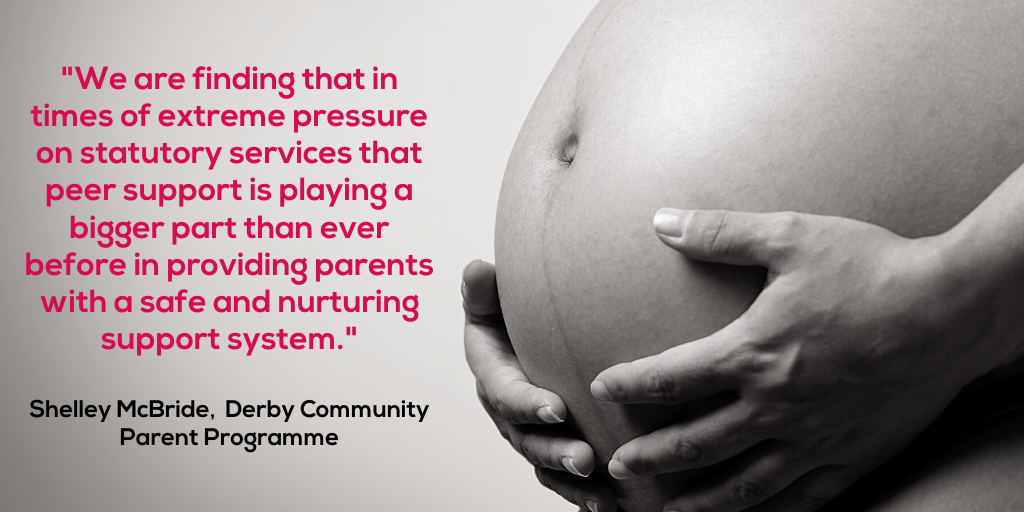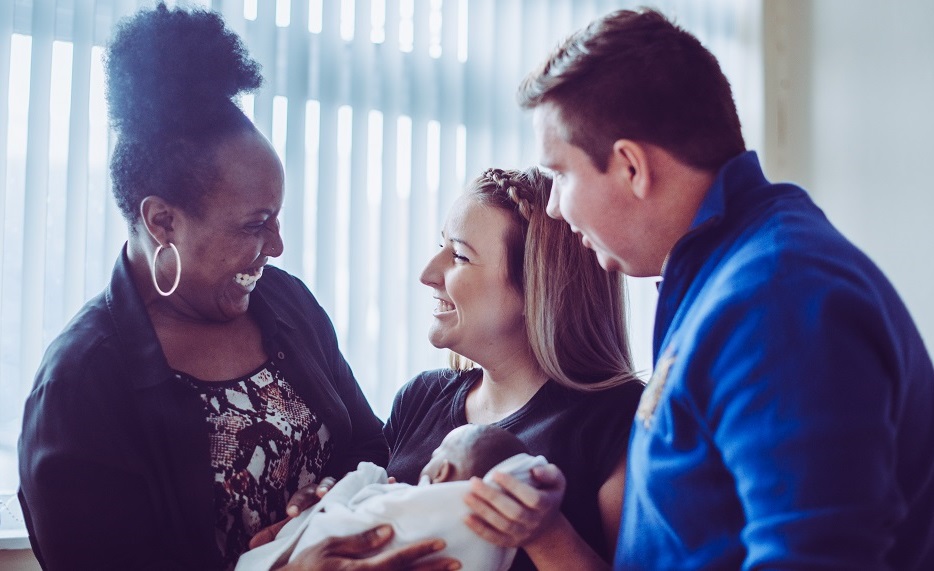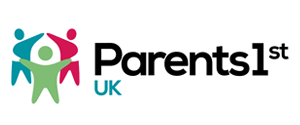Becoming a parent is a life-changing experience. Whilst this should be a wonderful time, filled with hope and precious moments, for many parents this is not always the case for a variety of reasons. Different emotional and practical needs can make this time stressful and difficult to navigate.
The evidence that peer support contributes to healthier pregnancies, better births and happier babies is overwhelming. Carefully recruited, well-trained and supervised peer supporters can provide knowledge, emotional support, practical help and social interaction. Mothers, fathers and partners feel supported, prepare for changes ahead, and feel less stressed.
“Peer support is one of the most important things to offer to pregnant women… If you’re pregnant and you’re going through this big life event, you want that support. The evidence really backs up peer support and shows that it’s really effective, more so than a lot of clinical treatments, especially for reducing stress.”
Rachel, Midwife at Barkentine Birth Centre
One-to-one support empowers parents to make informed choices and most of those who receive informal support see statistically significant improvements across a range of outcomes.
They are more aware of how to keep well during pregnancy, feel better prepared for labour and birth, and the transition to parenthood. They are also more confident to access community services when they need to and to communicate with professionals involved in their care.
Local midwives find the additional support invaluable:
“We refer to the Pregnancy Pal and Birth Buddy programme with complete confidence that these ladies will receive the best possible support. Knowing they are supporting one of our ladies reassures us because we know that for some women – it’s all they have. The peer support fills a void for some women and for some they are a lifeline. The peer supporters don’t judge...women know this and feel safe. Peer support enhances the pregnancy experience in terms of support and parenting education. The peer supporters offer a service that is invaluable to our team”
Vicky Stewart, Specialist Midwife, Basildon and Thurrock University Hospitals NHS Trust
Across the country there are many excellent examples of quality perinatal peer support initiatives operating in collaboration with professionals – Island House Charity and Ripplez CIC are just a couple of examples!
The informal nature of peer support sets it apart from professional support – the two are very different but complement each other. Pregnant women often describe their peer supporter as “someone in my corner” who is by their side, helps them to keep well and navigate services.
Nipping early difficulties in the bud helps relieve some of the pressure that public services face. Early, informal support helps prevent escalation of need.

Furthermore, an appropriately trained volunteer with the right personal qualities can be a huge asset to a busy midwife during labour and birth. The emotional and practical support that a volunteer birth partner can provide helps take the strain off midwives, especially if the woman is vulnerable or has no partner. The midwife can concentrate on clinical care – whilst the volunteer enables easier 2-way communication, helps explain what’s happening, reassures and provides comfort.
Continuity of care for both mothers and fathers during this critical life transition can be especially hard for professional maternity services to offer. Many mums will see different midwives and other health professionals through pregnancy, birth and postnatally. Expectant fathers often say they feel side-lined.
A peer support volunteer however will be matched with a mum as early as possible in pregnancy and will continue to support her and her partner throughout birth and beyond. Having individualised support throughout this time allows parents to form a trusting relationship where they can feel comfortable to share feelings and worries.
This can help mums and dads to go on to engage with professionals in a timely way when they otherwise might not. Having someone in your corner who is there to listen, and not judge, can make all the difference in supporting parents to communicate their needs.
“I’m not good with things being taken out of my control. When I got pregnant the second time, I felt the choices were being taken from me again… I felt overloaded by all the information coming at me. So it helped to have someone there to talk things through with.”
Hayley, Mum
Parents 1st Essex Pregnancy Pal and Birth Buddy volunteers receive comprehensive training

This not only develops their skills and knowledge but also how to share reliable information about a range of issues such as practical baby-care, breastfeeding and emotional wellbeing to help parents prepare for parenting, recover after the birth and avoid the onset of postnatal depression.
Crucially, volunteers have their coordinator at hand if a parent’s or baby’s needs lie outside the boundaries of their role. Coordinators carry out an important safeguarding role and draw relevant professionals in at an early stage (health visiting, PNMHS, social care and local support groups) which helps to prevent escalation of need.
“We’re not there to do the job of midwives, nurses, or any other professionals, but what we can do is offer women our time when it is most needed, allowing the professionals to do their jobs, knowing their patient has got the emotional support they need.”
Annette, Parents 1st Essex Volunteer

